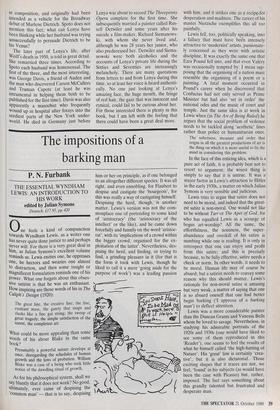The impositions of a barking man
P. N. Furbank
THE ESSENTIAL WYNDHAM LEWIS: AN INTRODUCTION TO HIS WORK edited by Julian Symons
Deutsch, f17.95, pp.420
11.10•1•■ 0 ne feels a kind of compunction towards Wyndham Lewis, as a writer one has never quite done justice to and perhaps never will. For there is a very great deal in him, as Julian Symons's excellent volume reminds us. Lewis excites one, he oppresses One, he hectors and wearies one almost to distraction, and then some insight or magnificent formulation reminds one of his Power. What one forgets about this obses- sive satirist is that he was an enthusiast. How inspiring are those words of his in The Caliph's Design (1920):
The great line, the creative line; the fine, exultant mass, the gaiety that snaps and clacks like a fine gut string; the sweep of great tragedy; the simple satisfaction of the surest, the completest art.
What could be more appealing than some words of his about Blake in the same book?
Presumably a powerful nature develops at once, disregarding the schedules of human growth and the laws of probation. William Blake was a case of a being who took little notice of the dawdling ritual of growth.
As for his philosophical system, shall we say bluntly that it does not work? No good, ultimately, ever came of despising the Common man' — that is to say, despising him or her on principle, as if one belonged to an altogether different species. It was all right, and even ennobling, for Flaubert to despise and castigate the 'bourgeois', for this was really a way of castigating himself. Despising the herd, though, is another matter. Lewis's version was not the com- monplace one of pretending to some kind of 'aristocracy' (the 'aristocracy of the intellect' or the like), and he came down forcefully and funnily on the word 'aristoc- rat', with its 'implications of a crowd within the bigger crowd, organised for the ex- ploitation of the latter'. Nevertheless, des- pising the herd, and finding, or trying to find, a grinding pleasure in it (for that is the form it took with Lewis, though he liked to call it a mere 'going aside for the purpose of work') was a leading passion with him, and it strikes one as a recipe-for desperation and madness. The career of his master Nietzsche exemplifies this all too painfully.
Lewis fell, too, politically speaking, into a fallacy that must have been intensely attractive to 'modernist' artists, passionate- ly concerned as they were with artistic discipline. It was exactly the same one that Ezra Pound fell into, and that even Valery was occasionally tempted by: I mean sup- posing that the organising of a nation must resemble the organising of a poem or a painting. A fatal moment occurred in Pound's career when he discovered that Confucius had not only served as Prime Minister but had also 'set in order' the national odes and the music of court and temple. Just the same idea is at work in Lewis when (in The Art of Being Ruled) he argues that the social problem of violence needs to be tackled along 'aesthetic' lines rather than police or humanitarian ones.
The soberness, measure and order that reigns in all the greatest productions of art is the thing on which it is more useful to fix the mind in considering this problem.
In the face of this enticing idea, which is a pure act of faith, it is probably best not to resort to argument; the wisest thing is simply to say that it is untrue. It was a major factor in Lewis's attraction to Hitler in the early 1930s, a matter on which Julian Symons is very sensible and judicious.
Lewis tries to argue that satire does not need to be moral, and indeed that the great- est satire is non-moral. One would not like to be without Tarr or The Apes of God, for who has equalled Lewis as a scourge of bogus art-worship? All the same, the effortfulness, the noisiness, the super- abundance and overkill of his satire is numbing while one is reading. It is only in retrospect that one can enjoy and profit from this satire; and this is precisely because, to be fully effective, satire needs a check or norm. In other words, it needs to be moral. Human life may of course be absurd; but a satirist needs to convey some reason why this should matter. Lewis's rationale for non-moral satire is amusing but very weak, a matter of saying that one is so absurd oneself that one had better begin barking CI approve of a barking man') to deflect attention. Lewis was a more considerable painter than the Duncan Grants and Vanessa Bells whom he loved to savage. Nevertheless, in studying his admirable portraits of the 1920s and 1930s (one would have liked to see some of them reproduced in this `Reader'), one seems to feel the results of what he himself called 'the high-hatting of Nature'. His 'great' line is certainly 'crea- tive', but it is also dictatorial. Those exciting shapes that it traces are not, we feel, 'found' in his subjects (as would have been the case with Picasso) but, rather, imposed. The fact says something about this grandly talented but frustrated and desperate man.


























































 Previous page
Previous page